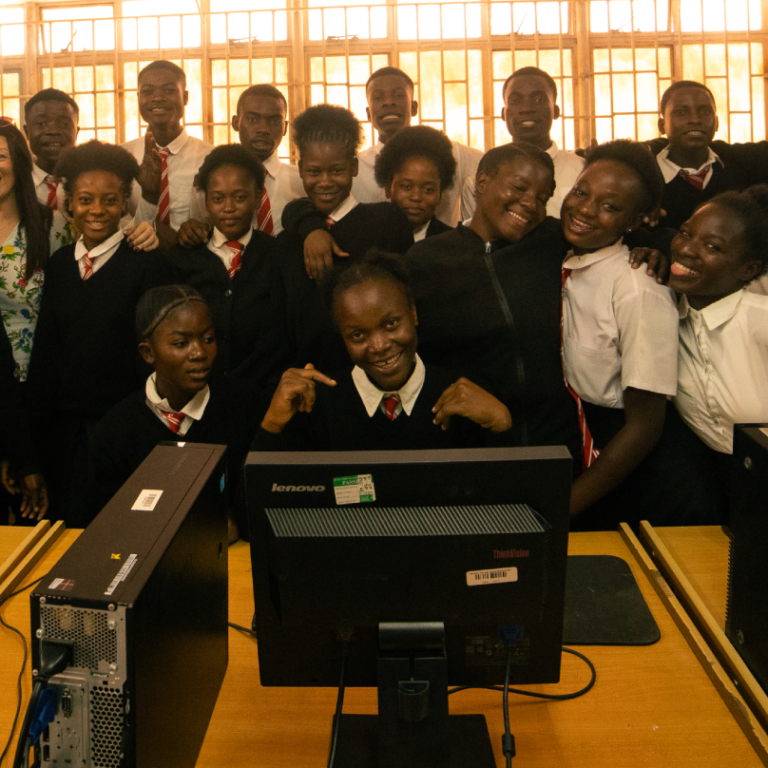Camara Education & Lenovo Tech for All Project

Empowering Education in Zambia: The Impact of Digital Learning Centres and ICT Clubs



Introduction
About Camara Education
Camara Education Ltd is a non-profit organisation dedicated to improving educational outcomes for disadvantaged students in Africa through access to technology. With a special emphasis on empowering young women, Camara supports schools by recycling surplus IT equipment, establishing digital learning centres, and providing extensive training for teachers and school leaders. Since 2005, Camara has installed over 145,000 computers, trained 69,320 teachers, and reached over 4.8 million students.
About Lenovo Corporate Philanthropy
Lenovo, a global leader in PC and smart device manufacturing, emphasises corporate social responsibility, particularly in advancing digital equity and STEM education. Through Lenovo Foundation initiatives, the company enhances opportunities in underrepresented communities, supporting access to technology and skills training that have long-term social impacts.
The Lenovo Tech for All Program
With support from The Lenovo Foundation, Camara Education partnered with the Ministry of Education in Zambia to integrate ICT into teaching and learning at 16 secondary schools from 2022 to 2023. This initiative has expanded in 2024, with four new Digital Learning Centres being established, including one at the University of Zambia’s School of Computer Science.
The project has impacted over 25,000 students, providing them with essential digital skills. It has also trained more than 440 teachers and 126 school leaders to effectively use technology in education. Through these efforts, 97% of students in the supported schools passed their Junior Secondary Computer Studies exams, addressing gaps in infrastructure and helping bridge the digital divide in Zambia.
Key Outcomes
Schools Supported:
In 2024, Lenovo provided funding for the installation of computer labs in four new schools, alongside continued support for the 16 schools previously equipped. This expanded the reach of digital learning across the country.
Student Impact:
Over 25,000 students across the project schools had the opportunity to benefit from enhanced digital learning, with 6,596 students receiving direct support to prepare for the Junior Secondary Computer Studies subject. This initiative has equipped students with valuable digital skills, preparing them for future careers in the digital age.
Pass Rates:
The project has contributed to a 97% pass rate in the Junior Secondary Grade 9 National Examination in Computer Studies. Notably, nearly 53% of the successful students were girls, marking a significant step towards bridging the gender gap in technology education.
Educator Development:
A total of 126 school leaders participated in leadership development sessions, empowering them to effectively integrate ICT into teaching and learning. This ongoing professional development ensures that educators are equipped to utilise technology and enhance the quality of education.
Infrastructure:
The project established fully networked computer labs equipped with modern technology, providing a solid foundation for digital learning in schools.
STEM Engagement:
To foster increased interest in STEM fields, ICT clubs were set up in project schools, offering students additional opportunities to improve their digital literacy and engage with technology beyond the classroom. These clubs also provide a platform to inspire more girls to pursue careers in STEM.
Project Goals
The primary aim of the Tech for All project is to enhance the quality of education in Zambian schools through access to technology. Specific objectives include:
Equipping schools with Digital Learning Centres to improve educational outcomes and support active learning.
- Providing training for teachers and school leaders to integrate ICT into teaching methods and day-to-day operations.
Offering students hands-on experience with technology to boost their digital literacy.
Developing the digital skills of both teachers and students to ensure they are prepared for the future workforce.
Monitoring the impact of technology on student engagement and performance, particularly in computer studies.
Project Impact
Lenovo’s support has had a transformative impact on the Tech for All project:
Student Impact: Over 25,000 students from 16 schools have gained valuable digital skills, supporting their future career prospects.
Improved Pass Rates: The project has achieved a 97% pass rate in the 2023 Grade 9 National Exams for Computer Studies, enabling students to secure better opportunities in education and the workforce.
Girls in STEM: Nearly 53% of those passing the exams were girls, a significant achievement in promoting gender equality in technology education. ICT clubs have further encouraged female students to pursue STEM careers.
- Sustainability: To ensure long-term impact, schools have established ICT clubs, offering students continued opportunities to develop their skills. Ongoing teacher training helps maintain high educational standards and ensures teachers can maximise the use of technology in their classrooms.
Challenges Faced
Despite the success of the project, Zambia experienced a severe drought in 2024, which significantly impacted the country’s electricity supply due to its reliance on hydroelectric power. This led to widespread load shedding, disrupting school operations and the use of computer labs. However, schools have shown commendable resilience in adapting to these challenges. Many have taken measures such as running computer labs outside of regular school hours and exploring alternative power solutions, including the use of generators, to ensure continuity of learning.
The Positive Impact of Partnership on Zambia’s Educational Landscape
- Brand Visibility: Both Lenovo and Camara have gained increased visibility within Zambia’s education sector, showcasing their commitment to digital inclusion and educational transformation.
- Corporate Social Responsibility: Lenovo has reinforced its reputation as a socially responsible company by supporting education and promoting digital access, demonstrating its ongoing commitment to sustainable development.
- Product Exposure: Lenovo’s technology has been showcased in a practical, educational context, potentially leading to greater adoption of its products within the education sector.
- Community Impact: The project has had a lasting impact on Zambia’s education system by equipping schools with modern technology and enhancing the capacity of educators to teach digital skills, thereby contributing to the broader development of the community.



Future Plans
As Africa continues to undergo a rapid digital transformation, the demand for technology in education has become even more urgent. Governments must invest in infrastructure that supports job creation, tackles poverty, and addresses the growing digital divide. The Tech for All project plays a crucial role in bridging this gap by helping students in under-resourced schools acquire essential digital skills.
Looking ahead, Camara and Lenovo are committed to expanding the project further, with plans to add three more schools and one digital learning centre at the University of Zambia in 2024. These efforts aim to provide students, including those at university level, with the resources and skills needed to pursue careers in STEM fields and contribute to Africa’s digital economy.
Conclusion
The Lenovo Tech for All project has been a vital partnership in enhancing digital literacy and expanding access to education in Zambia. With over 25,000 students directly impacted and more than 440 teachers receiving essential ICT training, the project continues to grow. It not only addresses immediate educational needs but also prepares future generations for success in the digital workforce.

